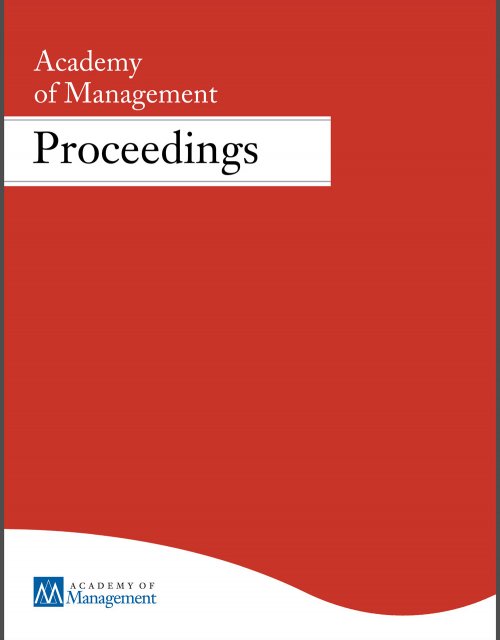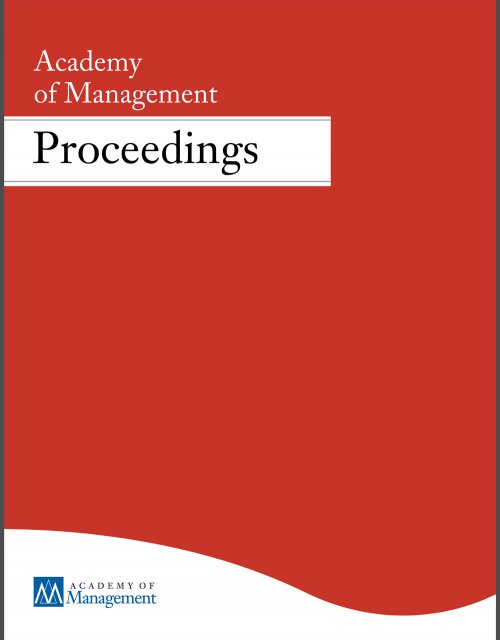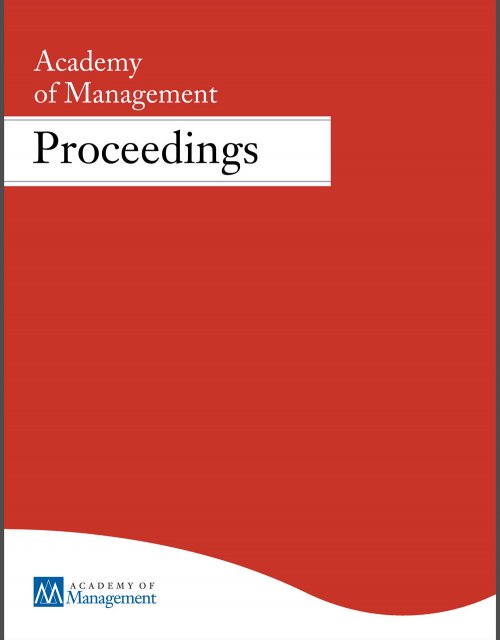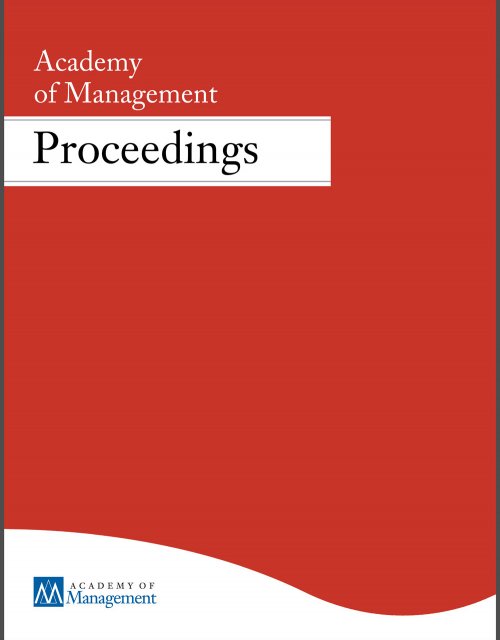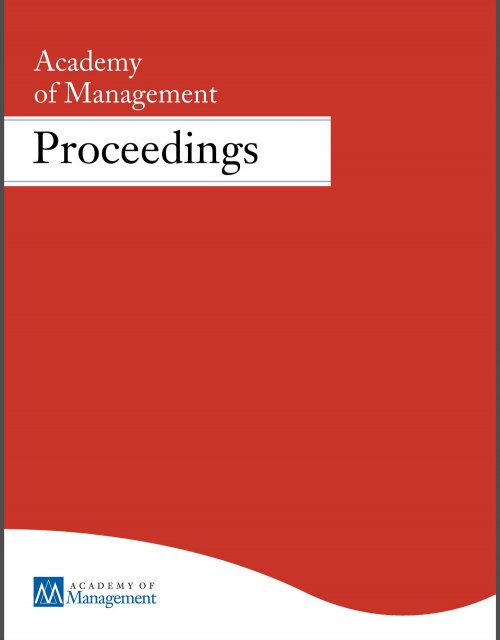Publication records
Subject(s)
Diversity and inclusion; Human resources management/organizational behavior
Keyword(s)
Diversity, networks, career advancement
The aim of this symposium is to understand, through the lenses of social identity theory and stereotypes theory, how network utilization and alters’ evaluations vary for members of minority and majority groups. Furthermore, the symposium also aims to explore how these theories contribute to explaining differences in the outcomes that members of majority and minority groups achieve even though they occupy similar network positions.
With permission of the Academy of Management
Volume
2021
ISSN (Online)
2151-6561
ISSN (Print)
0065-0668
Subject(s)
Technology, R&D management
Scientific research has for a long time been the domain of professional scientists, often working within the confines of academic or corporate labs. However, there are increasing calls from funding agencies, policy makers, and civil society to involve “crowds” and “citizens” in the research process. The hope is that such involvement can increase the productivity of research as well as the relevance and societal adoption of the knowledge that is produced. A growing number of crowd science projects now operate in fields as diverse as astronomy, biology, history, medicine, and physics. Results have been published in top tier journals such as Nature, Science, and PNAS. However, most of these projects “use” crowds for empirical tasks such as collecting and coding data (e.g., Zooniverse), or for problem solving (e.g., Foldit). There are only few efforts to involve crowds in earlier, “agenda setting” stages of scientific research such as the identification of research questions, the selection of problems that should be investigated, or the development, evaluation and funding of research proposals. To gain a deeper understanding of this emerging topic, distinguished panel members including scholars of science and science policy, as well as experts on crowdsourcing and open innovation, organizers of real-world efforts to involve citizens in agenda setting and interested AoM members discuss why crowd involvement in setting research agendas is, so far, more limited, whether crowds should get more involved in setting research agendas and if so, how this could be organized, and what the boundary conditions for crowd involvement in setting research agendas are.
With permission of the Academy of Management
Volume
2021
ISSN (Online)
2151-6561
ISSN (Print)
0065-0668
Inventors recombine existing knowledge elements to identify new technological solutions and novel inventions. We study how inventors’ reliance on different sources of knowledge, their personality traits, and the diversification of the organizational knowledge of their employers jointly determine recombination outcomes. In our theorizing, we distinguish inventors’ overall recombination success from the share of technologically novel recombinations. Our predictions are tested relying on a large-scale survey of 1,327 industrial inventors, enhanced with patent-based measures of recombination outcomes. The results confirm earlier findings that access to a diverse set of knowledge is positively related to both recombination success and the rate of novel recombinations. Further, we are able to show that this clear relation holds only for inventors employed by firms with low knowledge diversification. Finally, personality dominates the effect of inventors’ reliance on different sources of knowledge and is relatively more important.
With permission of the Academy of Management
Volume
2021
ISSN (Online)
2151-6561
ISSN (Print)
0065-0668
The assumption that better performance today predicts better performance tomorrow pervades nearly all behavioral theories of learning from experience in organizations. Because of the widespread reliance on the higher-is-better heuristic, theories predicting performance non-monotonicity---higher past performance generating lower future performance---are of long-standing interest in management theory and economic sociology. The extent of real-world violations of the higher-is-better heuristic is, at its core, an empirical question. However, there is very little research testing the higher-is-better assumption, despite its ubiquity in organizations and markets and the panoply of mechanisms detailing when it might fail. In part, the lack of empirical research on this very important question is driven by the weaknesses of existing methods for detecting non-monotonic relationships in data. The method applied here, which adopts a "shape constrained'' approach to statistical inference, avoids the well-known problems of testing non-monotonic associations in commonly-used methods based on linear regression. Our paper empirically tests the hypothesis of performance monotonicity in 12 datasets across four commonly-studied domains. Performance monotonicity is rejected in eight out of the twelve datasets examined and at least one dataset in all four domains demonstrates a non-monotonic performance pattern.
With permission of the Academy of Management
Volume
2021
ISSN (Online)
2151-6561
ISSN (Print)
0065-0668
Subject(s)
Diversity and inclusion; Human resources management/organizational behavior; Strategy and general management
Keyword(s)
Organizational inequality, M&A, gender, cultural norms, careers, wage gap
Extant literature in organizational inequality shows that environmental forces affect firm gender equality outcomes. While there is evidence that national gender culture affects individual economic outcomes, little is known about the influence of national gender culture at the firm-level. In this article, I use the context of cross-border acquisitions to study how national culture shapes firms’ arrangements towards gender equality as I explore how foreign acquisitions affect workplace gender equality at acquired firms. I use restricted-access employer-employee data from France matched to M&A data. I use a generalized differences-in differences approach to estimate the impact of acquirer national gender culture on gender equality outcomes at acquired firms after an acquisition. I find that firms acquired by acquirers from more gender egalitarian countries see a larger increase in female representation in management and larger decrease in gender pay gap post-acquisition, compared to firms that get acquired by acquirers from less gender egalitarian countries. This main effect is stronger when the post-acquisition integration process is more thorough and when a new CEO is appointed at the acquired firm.
With permission of the Academy of Management
Volume
2021
ISSN (Online)
2151-6561
ISSN (Print)
0065-0668
Subject(s)
Diversity and inclusion; Strategy and general management
Keyword(s)
Chance models, adaptation, organizational learning, luck, situation, risk-taking
Chance models—mechanisms that explain empirical regularities through unsystematic variance—have a long tradition in the sciences but have been historically marginalized in management scholarship. An exception is the work of James G. March and his coauthors, who proposed a variety of chance models that explain important management phenomena, including the careers of top executives, managerial risk taking, and organizational anarchy, learning, and adaptation. This paper serves as a tribute to the beauty of these “little ideas” and demonstrates how they can be recombined to generate novel implications. In particular, we focus on the example of an inverted V-shaped performance association among the executives featured in one of the most prominent lists of executives, Barron’s annual list of Top 30 chief executive officers. A reanalysis of March and Shapira’s 1992 model provides a novel explanation for why many of the executives’ exceptional performances did not persist. In contrast to the usual explanations of complacency, hubris, and statistical regression, the results show that declines may result from these executives’ slow adaptation, incompetence, and self-reinforced risk taking. We conclude by elaborating on the normative implications of Jim’s chance models, which address many modern management and societal challenges. We further encourage the continued development of chance models to help explain performance differences, shifting from accounts that favor heroic stories of corporate leaders toward accounts that favor those leaders’ changing fortunes.
With permission of the Academy of Management
Volume
2021
ISSN (Online)
2151-6561
ISSN (Print)
0065-0668
Subject(s)
Economics, politics and business environment; Finance, accounting and corporate governance
Keyword(s)
debt capital structure, bond debt, monetary policy, quantitative easing, universal banks, Glass-Steagall, central bank policy
JEL Code(s)
E00, G00, G20, G21, G28
This dissertation in the field of empirical financial economics broadly explores the interplay between monetary policy, debt securities markets and bank credit. Specifically, the three chapters of this dissertation share two major themes, debt capital structure and the effects of central bank policy. Chapter 1 studies a determinant of the corporate debt capital structure and it finds that the rise of universal banking conglomerates contributed to the increase in bond financing in the U.S. The article of Chapter 2 links the two themes by analyzing a mechanism that describes how the corporate debt structure influences the transmission of central bank policy to the real economy. When central banks purchase corporate bonds, purchase-eligible firms substitute bond debt for bank loans. This, in turn, frees up balance sheet capacity at banks that then start lending to firms without access to bond markets. Finally, chapter 3 is based on an article that examines to what extent central bank policy, among other causes, may be responsible for the low interest rates in recent years. It also analyzes the consequences of low interest rates and issues policy recommendations.
Subject(s)
Diversity and inclusion; Economics, politics and business environment; Ethics and social responsibility; Health and environment; Technology, R&D management
Keyword(s)
disinformation, social media, oral culture, fact-checking
JEL Code(s)
I0
The article examines the risk of the proliferation of potentially harmful disinformation through 'oral' social media services such as Clubhouse. While false or misleading information may have fewer means to stick and go viral, it is also more difficult to fact-check speakers, which may create new vulnerabilities for the information ecosystem online.
Subject(s)
Ethics and social responsibility; Finance, accounting and corporate governance
Keyword(s)
board of directors, codetermination, corporate governance, climate governance, climate change, sustainability
The codetermination principle – as seen in the German corporate governance system – provides a solid foundation for achieving climate and sustainability goals. The involvement of employees needs to be coupled with more diversification parameters used for appointing non-executive directors as well as building sustainability expertise and proper incentives for acting sustainably. The Climate Governance Initiative in Germany among others can help non-executive directors in becoming stronger and even more capable sustainability ambassadors within their companies.
ISSN (Print)
0015-6914
